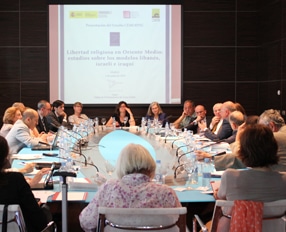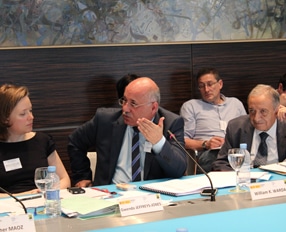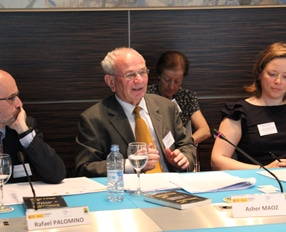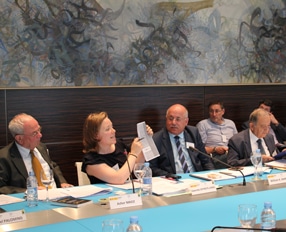On the occasion of the presentation of the study “Religious Freedom in the Middle East: Lebanese, Israeli and Iraqi models” the Centre for Middle Eastern Studies of the Foundation Social Promotion of Culture (CEMOFPSC) gathered last June the 3rd in the Arab House of Madrid experts in religious freedom, human rights and minority situation in the region, coinciding with the meeting in Brussels of the European Parliament Intergroup of freedom of religion or belief and religious tolerance (EP Intergroup on FORB & RT) where they presented their first activity report.
Cristina Fraile, Deputy Director General of the Office of Human Rights, Ministry of Foreign Affairs and Cooperation, Eduardo López Busquets, Director General of Arab House, and Jumana Trad, President of the Foundation Social Promotion of Culture, formulated a welcome speech and gave way to the session on models of religious freedom in the Middle East.

The president of the FPSC in her speech said: “In view of recent developments being experienced in the region, with their cargo of destruction and horrors, which are seriously endangering the very existence of many of its religious minorities, I would ask that we have always present, as an incentive during this meeting, the crucial role of the protection of human rights in general and in particular religious freedom, coexistence and key source of integral promotion of the human being, of course essential to the establishment of lasting peace and stability for all. “
The session was conducted by Gwenda Jeffreys-Jones, political analyst of the Middle East and the European Union, and counted with the participation of the authors of the study: William K. Warda, Member of the Executive Board of Alliance of Iraqi Minorities (AIM), Vice-President of the Network Forum of Iraq Human Rights Organizations and Chairman of Hammurabi human rights organization, since 2007 till 2013, Prof. Antoine Messarra, Professor of Constitutional Law, Comparative Politics Law and Sociology at the University Saint Joseph, Lebanon, and Prof. Asher Maoz, Dean of Peres Academic Centre of the Faculty of Law at the University of Tel Aviv, Israel.

Warda (Iraq) explained that in view of the study performed, beliefs are a fundamental pillar of human life, and there is an urgent need to achieve the objective of ensuring their right; the protection of belief freedom enhances respect for human rights and contributes to increasing stability and civil peace. An individual, in his words, cannot easily accept to abandon their beliefs and faith, history is witness to religious conflicts marked by cruelty and horror, based on the protection of beliefs and faith.
Freedom of belief conceived separately from respect for other basic human freedoms such as thought, opinion, assembly and education would lack any sense.
To refuse recognition of religious diversity and freedom of belief and the denial of the cultural diversity in a country exacerbates the problem of governance.
In Iraq, with many articles in its constitution that emphasize on freedom of belief, we still find laws that are incompatible with them. The Iraqi constitution protects the fundamental right of religious freedom whereas particular laws undermine it. The growth of fanaticism day to day constrains the right to religious freedom which is included in the law.

Messarra (Lebanon) explained that strengthening the system of Islamic-Christian parity (munasafa) in Lebanon is the aim of the declaration adopted by the National Pact of Taif Agreement and the constitutional change on 21st September 1990. The courts have always defended their country’s freedom of belief and religion. He stressed that fundamentalism and fanaticism are the product of university academic activity.
Maoz (Israel) highlighted that religious freedom is already guaranteed indirectly with the law of the constitution of the State of Israel and a subsequent regulatory development. He stressed that Judaism is both a religion and a nation.
The Jewish population in Israel is diverse and we found from extreme orthodox to secular, even atheists. But we must say that none is alien to Jewish culture.
At the end of the session an open debate was held with the attendees, moderated by Prof. Dr. Rafael Palomino, Professor of Ecclesiastical Law at the Complutense University in Madrid
I- Les libertés religieuses au M-O : des approches renouvelées ANTOINE MESSARRA 15 juillet 2015 L’Orient Le Jour
II- Les garanties constitutionnelles des libertés religieuses au Liban ANTOINE MESSARRA 16 juillet 2015 L’Orient Le Jour


